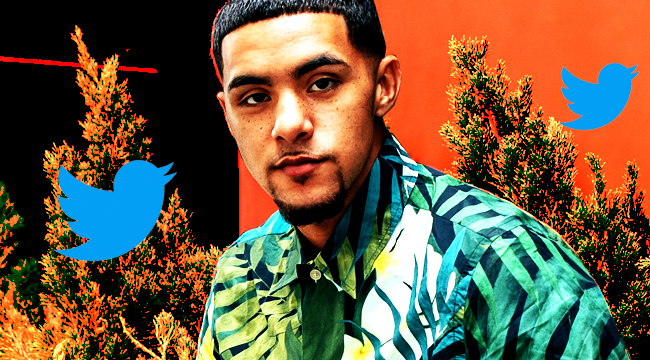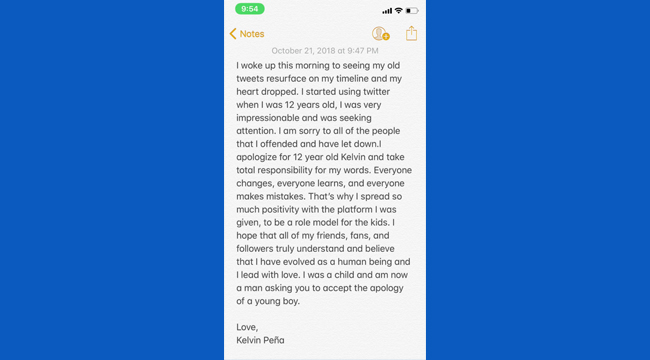
When Kelvin Peña aka Brother Nature looked at Twitter on October 21st, he was met with a shock. As with James Gunn and a handful of other celebrities, old tweets had surfaced that painted their author as cruel, bigoted, and deeply misogynistic. For Peña, these tweets from 2011-2012 included racist, sexist, and anti-semitic insults. Inexcusable words with painful histories attached to them. The social media star was horrified and embarrassed.
“I freaked out,” says Peña, who became famous for his tenderness interacting with animals. “I panicked. I thought it was all over.”
Peña, 20, says he doesn’t even remember posting the tweets. Mostly, because he was in middle school at the time they were written. Between the ages of 12 and 13, he tweeted things like, “Jay-Z look like a Monkey,” “Heil Hitler,” and “When I grow up I wanna be like Chris Brown. So if my girlfriend tried to look through my phone while driving I can choke and punch her :D.”
These are terrible things to say. Shock humor at its worst — abrasive setups that are devoid of punchlines. And they’re not anything that ought to be flippantly explained away by their author’s age. Peña, who is of Puerto Rican and Dominican descent, seems to understand this. His mom was a victim of domestic abuse when he was young, he says. He can’t fathom thinking the Chris Brown tweet was funny. When discussing this time, he paints a picture of a kid who was hurting and trying to get attention — positive or negative. At 12, in the early-ish days of Twitter, saying shocking things seemed like an easy way to do that.
But the internet never forgets. And seven years later those tweets would stand in stark relief to the reason for Peña’s fame: His compassion, positivity, charity work, and animal activism.
https://www.instagram.com/p/BnuMOI9B5FS
Kelvin Peña rose to social media stardom in 2016, when a video he made while feeding a deer in his yard went viral. That’s the whole video — just a teenager brimming over with excitement while talking about a deer. It spoke to people. It was joyful.
Peña quickly embraced the earnestness of his personality. He calls the deer names like Canela and Tay Tay. He joyously greets them (and other animals), he dances, hugs baby pigs, and acts silly. His videos are guileless. They don’t feel like an act. And the fact that he’s a person of color when virtually all other animal-loving celebrities are white feels like a breath of fresh air.
The formula worked. Peña — known widely by the nickname “Brother Nature” — has 2.2 million Instagram followers and 1.5 million followers on Twitter. That’s a lot of people just searching for a little positivity in their feeds. Positivity that Peña says came out of finding faith unexpectedly. Before becoming a viral star, he was just a depressed 17-year-old kid. He’d gone through a difficult break-up and was considering suicide.
One day, teetering on hopelessness, Peña heard a voice that told him to keep going — to live his life in the light and with positive energy. He listened. A month later the first video went viral.
“There’s so much negativity and so many messed up things going on in the world right now,” he says, “it’s like — it should just be your duty as a human being to be the light and just be a good person.”
As an adult, Peña does his best to walk his talk. He set up a charity at 18 (shortly after things blew up for him), The Everybody Eats Foundation, to help families get access to food. The cause resonates with him because as a kid he often went hungry.
“Growing up, all we needed was help,” he says. “We should just, as people, help each other. With great power comes greater responsibility and my duty as a human being is to just help others with this ‘talent’ I was given.”
Last year, Peña (who spent time living in Puerto Rico as a boy) used his foundation to raise money to ship supplies after Hurricane Maria devastated the island.
“It was like ‘Now, I have a reason to live,’” he says of his charitable works. “‘I have a reason to help others, to help animals. I feel like I found my purpose.’ And I just wanted to use it to help others because it’s like, damn, I never expected this. You know what I mean? I’m still just in awe every day.”
Peña seems to sense the fact that celebrity is neither owed nor lasting. After the tweets surfaced and he’d apologized profusely, several brands dropped him as a partner. Fans condemned him. He lost some followers. What he didn’t do, was go silent.
“Life is about growth,” he says. “I feel like everybody should look forward every day just to being a better person, a better version of themselves.”

The tricky thing about Peña’s bad tweets is, obviously, how young he was. While people like James Gunn were adults making offensive jokes, Peña was a kid. Culturally, we haven’t really wrestled with this before. Peña is part of the first generation that was given a permanent record of their every thought at an age when the human brain is still focused on testing boundaries.
The situation challenges the internet’s capacity for nuance. It poses big questions. Can there be degrees of a bad thing? Does context matter? When a teen tweets a song lyric is he just as responsible for its messaging as the artist who wrote it? Does the trauma of processing domestic violence in one’s own family excuse joking about the behavior of a role-model who abuses women? Is there a marked difference between Roseanne tweeting something racist in 2018 and a Latinx kid tweeting something racist at 12?
Or are there some sins we make as pre-teens that we just can’t escape no matter how much good we do as adults? Are there some things we say that deserve to haunt us forever?
Going forward, Peña hopes his story will be a lesson to young people about the permanence of social media but also a reminder that you can grow and change. He hopes he can be a better role model than the ones he had — so the kids looking up to him tweet about the beauty of nature rather than ugly, anti-semitic slurs.
“That’s not the person I am,” he says. “I feel like I’ve grown in all aspects of my life. As a better sibling, as a better public figure, as a better friend to others. It’s all about growing and learning and just trying to be better and better.”
While he senses that he needs to continue to make amends, Peña thinks a net positive has come out of his story. He was dragged, he was scorned, but he wasn’t fully canceled. He’s going to get a chance to make things right. His fans now know that he’s just like them — a real person who has flaws. That’s the attitude he wants to project. Yes, his younger-self wrote deeply caustic things, but he hopes to lead a life that far outweighs his Twitter toxicity.
“We’re all human — celebrities, everybody,” he says. “Everybody thinks celebrities are perfect but at the end of the day, everybody’s human.”






